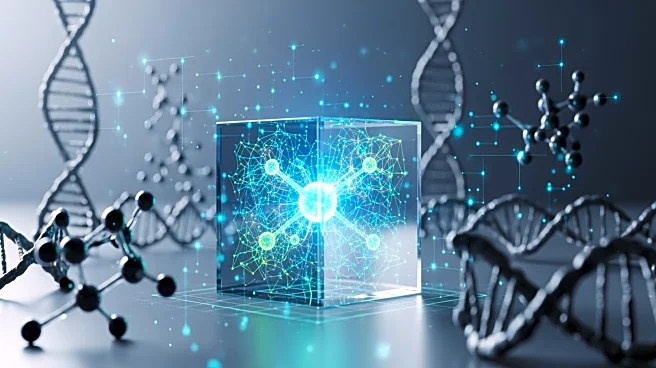What's Happening?
Artificial intelligence (AI) is revolutionizing the field of drug discovery by leveraging biological data centers to enhance the accuracy and efficiency of medical research. These centers utilize robotic systems to maintain human tissues that can be dosed,
bleed, and heal, providing a more reliable substrate for AI models to test drug candidates. This approach aims to move beyond traditional animal models, which often fail to predict human responses accurately. The United States is currently facing competition from countries like China, which are rapidly advancing their biological infrastructure. The U.S. Food and Drug Administration is showing openness to integrating human-relevant evidence into drug development processes, potentially replacing or complementing animal models.
Why It's Important?
The shift towards using human tissues in drug discovery is significant for several reasons. It addresses ethical concerns associated with animal testing and aims to reduce the high attrition rates seen in late-stage drug development. By providing more accurate human data earlier in the process, this approach could lead to more efficient and humane drug development. The integration of AI with biological data centers could redefine the pharmaceutical industry, making drug discovery a more predictable and systematic process. This development is crucial for maintaining the U.S.'s competitive edge in global medicine and ensuring that future medical advancements bear an American signature.
What's Next?
The next steps involve scaling up the infrastructure for biological data centers in the U.S. to match or exceed international efforts. This includes policy shifts and increased investment in human-relevant evidence systems. The FDA's modernization act and workshops on New Approach Methodologies indicate a willingness to embrace these changes. As the industry adapts, clinical trials may become more confirmatory rather than exploratory, reducing risk and increasing predictability in drug development. Stakeholders, including regulators, investors, and patients, are likely to push for faster adoption of these technologies to improve outcomes and reduce costs.
Beyond the Headlines
The ethical implications of moving away from animal testing are profound, potentially setting new standards for humane research practices. Additionally, the economic impact could be substantial, as more efficient drug development processes may lower costs and increase accessibility to new treatments. This shift could also influence global health policies, as countries that lead in this area may set new benchmarks for medical research and development.
















